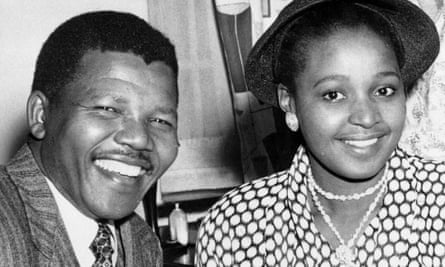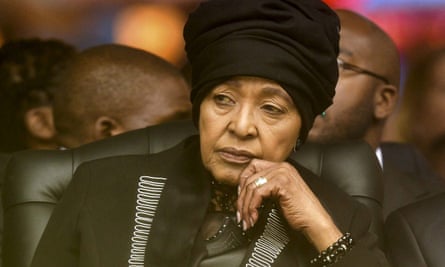Winnie Madikizela-Mandela, a hero of the anti-apartheid struggle in South Africa but also one of its most controversial figures, has died aged 81.
The ex-wife of the former South African president Nelson Mandela, she died at a hospital in Johannesburg after a long illness, her personal assistant, Zodwa Zwane, said.
Seen as the “mother of the nation” by many who admired her steely leadership, firebrand rhetoric and courageous activism against a brutal racist regime, Madikizela-Mandela was also repeatedly accused of being linked to violence and corruption.
She was one of the few remaining representatives of the generation of activists who led the fight against apartheid. Her often negative image abroad contrasts with her deep and long-lasting popularity within her homeland.
A statement from her family said the former political prisoner, who used her family name of Madikizela after her divorce, had been “in and out of hospital since the beginning of the year”.

“She succumbed peacefully surrounded by her family and loved ones in the early hours of Monday afternoon,” the statement said.
“Mrs Madikezela-Mandela was one of the greatest icons of the struggle against apartheid. She fought valiantly against the apartheid state … sacrificed her life for the freedom of the country and helped to give the struggle for justice in South Africa one of its most recognisable faces.”
Archbishop Desmond Tutu, another veteran of the struggle, was among those paying tribute. He said she was “a defining symbol” of the anti-apartheid struggle whose “courageous defiance was deeply inspirational to ... generations of activists”.
Fikile Mbalula, a senior member of the African National Congress (ANC), described “Mama Winnie” as “a great symbol for the resistance against a brutal government”.
Jeff Radebe, South Africa’s minister of energy, said: “Mama Winnie Mandela was recognised by the people as the Mother of the Nation. As the ANC we dip our banner.”
Yet there was a darker side. “What you have in her is both the sense of possibility and failure together; hope and disappointment,” Njabulo Ndebele, the author of a novel about her life, told the Guardian in 2011.
Born in the poor Eastern Cape province, Madikizela-Mandela’s childhood was “a blistering inferno of racial hatred”, in the words of British biographer Emma Gilbey, and she became further politicised at an early age in her job as a hospital social worker.

Attractive, articulate, clever and committed, the 22-year-old Winnie caught the eye of Mandela, 18 years her elder, at a Soweto bus stop in 1957. They were married a year later.
But the union was short-lived. Mandela had gone underground by 1960, was arrested in 1962 and sentenced to life imprisonment for treason.
During her husband’s 27-year incarceration, Madikizela-Mandela campaigned tirelessly for his release and for the rights of black South Africans, establishing a massive personal following.
Tortured and subjected to repeated house arrest, she was kept under surveillance and, in 1977, banished to a remote town in another province.
Madikizela-Mandela said the experience of more than a year in solitary confinement changed her. “What brutalised me so much was that I knew what it is to hate,” she said.
“The years of imprisonment hardened me ... Perhaps if you have been given a moment to hold back and wait for the next blow, your emotions wouldn’t be blunted as they have been in my case. When it happens every day of your life, when that pain becomes a way of life ... there is no longer anything I can fear. There is nothing the government has not done to me. There isn’t any pain I haven’t known.”
As the violence of the apartheid authorities reached new intensity, Madikizela-Mandela was drawn into a world of internecine betrayal, reprisals and atrocity.
“We have no guns – we have only stones, boxes of matches and petrol,” she told a township crowd. “Together, hand-in-hand, with our boxes of matches and our necklaces we shall liberate this country.” Necklacing was the term for killing a perceived traitor with a petrol-filled burning tyre around the neck.

Most notoriously, Madikizela-Mandela was found guilty of ordering the kidnapping of a 14-year-old boy, Stompie Seipei, also known as Stompie Moeketsi, who was beaten and later had his throat slit by members of her personal bodyguard, the “Mandela United Football Club”, in 1989.
Within a year, she gave the clenched-fist salute of black power as she walked hand-in-hand with Mandela out of Cape Town’s Victor Verster prison on 11 February 1990.
For husband and wife, it was a crowning moment that led four years later to the end of centuries of white domination when Mandela became South Africa’s first black president.
But for Madikizela-Mandela, the end of apartheid marked the start of a string of legal and political troubles that, accompanied by tales of her glamorous lifestyle, kept her in the spotlight for all the wrong reasons.
Appearing at the Truth and Reconciliation Commission (TRC) set up to account for atrocities committed by both sides in the anti-apartheid struggle, Madikizela-Mandela refused to show remorse for abductions and murders carried out in her name.
Only after pleading from Tutu, the anguished TRC chairman, did she admit grudgingly that “things went horribly wrong”.
In its final report, the TRC ruled that Madikizela-Mandela was “politically and morally accountable for the gross violations of human rights committed by the MUFC”.
She and Mandela separated in 1992 and her reputation slipped further when he sacked her from his cabinet in 1995 after allegations of corruption. The couple divorced a year later.
“I have a good relationship with Mandela. But I am not Mandela’s product. I am the product of the masses of my country and the product of my enemy,” she told reporters.
Still unafraid of controversy and still popular, in 2008 she took up the cause of immigrants who had come under attack in widespread riots. A year later, she won a parliamentary seat.
Though she was harsh about his record in office, Madikizela-Mandela could be seen almost daily visiting her ailing former husband during his last months in 2013.
In her last interview, given last month and rebroadcast on Monday afternoon by state broadcasters, Madikizela-Mandela spoke of how she had always put the collective good of the ANC before her individual wellbeing.
The party, in government in South Africa since the 1994 elections, faces a tough election next year. Officials and supporters hope that the new president, Cyril Ramaphosa, who took power in February, can reverse the decline in support suffered by the ANC under previous incumbent Jacob Zuma.
Ramaphosa’s office said the president would be visiting Madikizela-Mandela’s home in Soweto on Monday evening.
Though analysts have now upgraded expectations of economic growth in South Africa, huge challenges remain. Unemployment remains at an historic high of 27.7% across the general population and as high as 68% among young people. Corruption has not just undermined public finances but also public confidence in the state.
“I would be extremely naive if i suggested to you that South Africa today is what we dreamt of when we gave up our lives .... We came from a very brutal period of our history, a country that was segregated, [and] to transition from that era to where we are today has been a really painful journey, ” Madikizela-Mandela said in the interview.
Madikizela-Mandela’s given name, Nomzamo, has been variously translated as “one who strives” and “she who must endure trials”.







